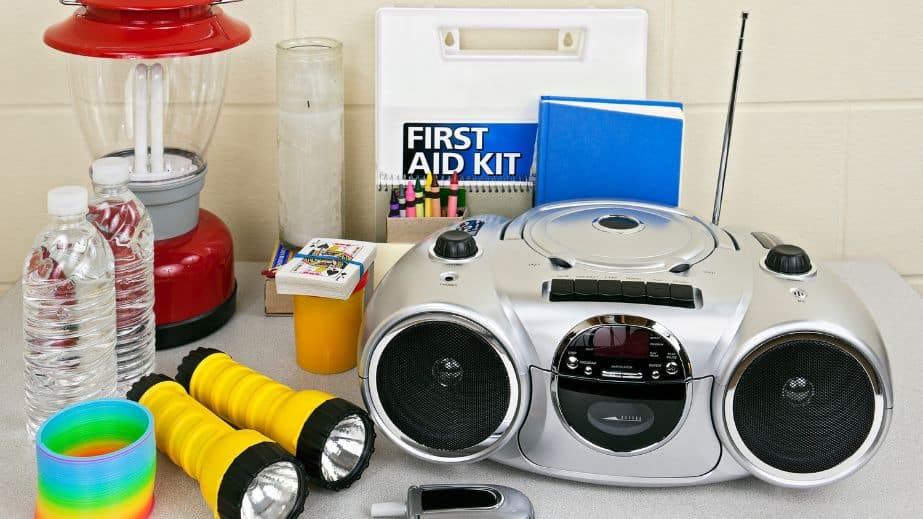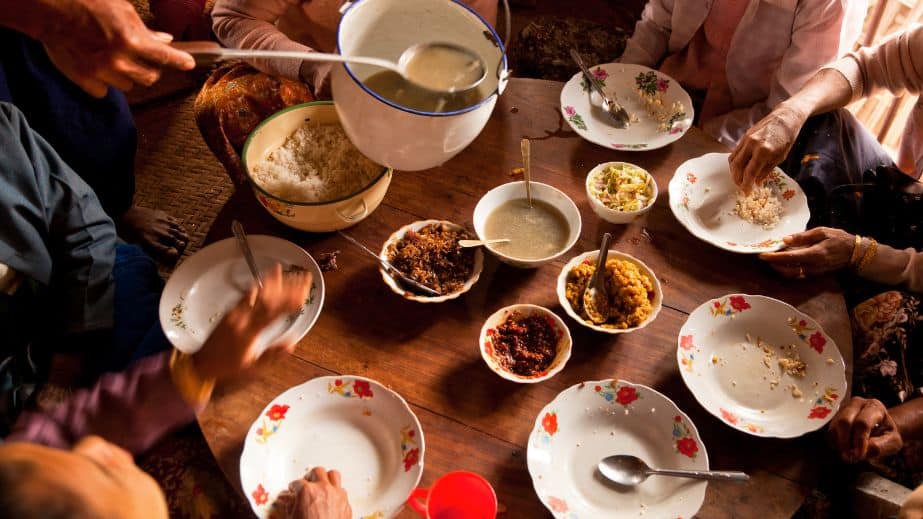We all have quirks and issues stemming from our childhoods. For most of us, growing up on modest means was all we knew. While we’re not alone in our meager upbringings, there are clues we had little to work with and certainly less than a silver spoon in hand. So, for all of you who had to work through school, put food on the table, wear hand-me-downs, or buy your clothes growing up, this one’s for you.
If the Shoe Fits

If you’ve ever had to squeeze your toes into shoes that didn’t fit, you’ll understand where our first contributor comes from. On the other hand, shoving a sock into the toe of your shoes so they’d fit is also a possibility. “I have ‘poverty toes,'” one commenter explains. “Growing up, we didn’t have much money, so we wore shoes until they died, regardless of fit. My toes curl and have prominent knuckles from being scrunched into too-small shoes.”
Windfall Money

As someone who often grew up without, the struggle with impulse spending is relatable. That genuine feeling that if you don’t buy it now, you won’t be able to later is easy to remember. Thanks to one person, I know I’m not the only one. “Spending any windfall money. The bone-deep certainty that money will…go away. There will always be another surprise bill, or the car will break down. If you get some extra money, you buy the kids a trampoline because for once you don’t have to say, ‘No, we can’t afford that.’
Prepper in the Making

If you ever want to know if someone grew up poor, look in their car. Often, people who grew up struggling will have preparations in their trunk or hatch for when things go wrong (because things always go wrong.) One individual shared their experience online, “My wife asked me why I have three umbrellas in the car the other day when she was putting something in the trunk. She was already used to the gallon of water, blanket, emergency rations, folding shovel, and paramedic-level first aid kit taking up half the trunk, but the umbrellas surprised her.”
What Money?

For a lot of us who grew up on meager means, money was something that just appeared. I didn’t know how my parents managed things, and sometimes they didn’t. Financial literacy isn’t usually a concern for parents to teach their children when they don’t have any money. One commenter understands this point, “If you grew up poor, chances are you had no one around to teach you about how to manage things like mortgages, large amounts of savings, or how to budget past the point of juggling bills.”
Sweet Treats

This next one resonated so hard. When you’re poor, buying candy and sweets is like winning the lottery; it doesn’t happen often, if at all. As a child, you learn to adapt. One respondent said, “We enjoyed cinnamon, sugar, and butter on a slice of toast because we couldn’t afford sweet treats.” Next time you want something sweet, give this a try. You won’t be disappointed.
Obesity

When I was growing up, cleaning your plate wasn’t an option; you did it, period. If you had room for dessert, you had room to finish your food. One participant shared how their childhood experience shaped their relationship with food. “I’m a foster kid. I was always poor and pretty much had nothing.
I always have leftovers. I never waste food and eat everything on my plate.” For the Boomer and Gen X generations, cleaning your plate, especially at dinner, was a given. It’s something I had to learn to let go of when I had children because it can easily lead to overeating and obesity.
Skills for Days

Being able to repair cars, plumbing, electrical, and other household issues is an essential part of growing up in poverty. When money only covers essentials like food, clothes, and shelter, there’s nothing left for a broken-down car, lousy plumbing, or a faulty outlet. This situation was especially true before the days of tutorial sites like YouTube. As one interested party said, “Having a vast skill set! Trust me, you learn yourself when you can’t afford a repair man, hairdresser, seamstress, builder, roofer, welder, mechanic, etc..”
Shoeless Joe

One very real hardship for people who grew up poor is the idea of throwing things away. I’ve glued more shoe soles than I care to admit and agree with one poster that shoes can have several lifetimes available from the time you first put them on. “I can’t throw away shoes. I accumulate athletic shoes; they go from running to everyday shoes to working in the yard. And then, eventually, my wife throws them away. I don’t know why, but I can’t do it.”
Wardrobe Recycle

New clothes are a pipe dream when money is tight or nonexistent. The thrift store, hand-me-downs from older siblings or cousins, and the clearance rack become your Saks Fifth Avenue and Macy’s. And when you can’t shop there, recycling your wardrobe is the only option left. Someone clearly understands this: “Wearing the same clothes often/daily. Many kids I’ve seen at school wear the same clothes quite often.”
School Lunch

As another person noted, people who grew up poor usually really enjoy school lunch. “Oh my gosh, I used to love school pizza with the little weird pepperoni cubes. Sometimes, I buy the cheap single pizzas in the frozen section for the same reason!” Pizza day at school was like carnival day at the fair. It was always an event to attend.
Government Cheese

One surefire sign of poverty between 1982 and the early 1990s was the delicious USDA-issued government cheese. For one user, it was a sign that they knew someone who was poor. “When I was young, I once got invited over to a friend’s house for lunch and noticed they had a brick of USDA government-issued cheese. This moment was eye-opening for me and the first time I realized I knew someone who was ‘poor.’ ”
Cost vs. Value

Financial literacy is challenging to teach to someone who grew up poor, especially when explaining the idea of cost vs. value. Suppose the cheap version of a necessity costs $50, but you could spend $200 and get that same necessity and have it last for years. In that case, the $50 deal still looks better to someone who has never had a lot of money, even if they have to pay that same $50 every six months or annually. The one-time cost of $200 seems so much when money hasn’t been easy to have that they can’t see the difference and will almost always pay out that same $50 over spending the $200 for what might last them ten or twenty years.
It’s a struggle for several people who posted to the online forum, including one person who had trouble helping their wife understand, “My wife grew up poor based on what I’m reading here. We do alright now, but trying to get her to change her thought process from ‘cost’ of something versus ‘value’ of a more expensive version has been a challenge.”
A Good Deal

One issue people struggle with when they grow up poor is “waiting for a good deal.” We can’t handle paying full price for anything, so we sit around pining for things because they aren’t, in our eyes, a good deal. One poster’s husband feels the same: “My husband and I both grew up in struggling families. This morning, he told me about a new (inexpensive/under $3) food he’d like to try. I said I’ll watch for it at the store, and he said, ‘Okay, but only buy it when it’s a good deal.'”
Poor People’s Food

Rice is likely a staple for people who grew up poor because it goes with many dishes and is filling and cheap. My husband and I make a dish called “poor man’s chili.” It is a hamburger, pork-n-beans, and rice dish. The hamburger is the most expensive part; overall, you can feed many people for a few dollars. Enjoying what would typically be classified as ‘poor people’s food’ is a classic sign that you grew up on little money, just as this reader did. “I love poor people’s food.”
Milk

I don’t know if this is specifically a sign of being poor, but I remember my mother always buying our milk in bags as a child, and I found it oddly cool. One thing I do know, however, is that shelf-stable milk or, god forbid, powdered milk is the worst non-alcoholic beverage known to humanity outside of stagnant water. Get your milk from the cold section, people! Someone else was also keen on their bagged milk, “I already buy my milk in bags! I wish I could buy my cereal in bags as well! ”
Some Things Stick

No matter how you may be doing financially now, some of the struggles you went through as a child tend to stick around because they are such ingrained behaviors that changing them doesn’t often seem worth the effort. Sometimes, there’s a whole psychology behind these behaviors as well. If your issues aren’t negatively affecting your life or the lives of those you love, laugh and enjoy your quirks. If they are, get some therapy and work through some issues to improve your quality of life. And then indulge yourself in some delicious “poor people’s food.”
Source: Reddit.
19 Simple Habits That Are Stealing 95% of Your Time

19 Simple Habits That Are Stealing 95% of Your Time
12 Things Only People Who Grew up in the 70s Will Understand

12 Things Only People Who Grew up in the 70s Will Understand
The 9 Best Travel Backpacks For Women in 2024

To assist you in making an informed purchasing decision, we’ve compiled all the necessary information and curated a list of the top nine travel backpacks for women. Rest assured, we’ve got you covered every step of the way on your exciting journey.
The 9 Best Travel Backpacks For Women in 2024
15 Harsh Realities About Life No One Wants to Admit

15 Harsh Realities About Life No One Wants to Admit
10 Terrible Reasons Why Today’s Society Isn’t Set Up For Raising Children
